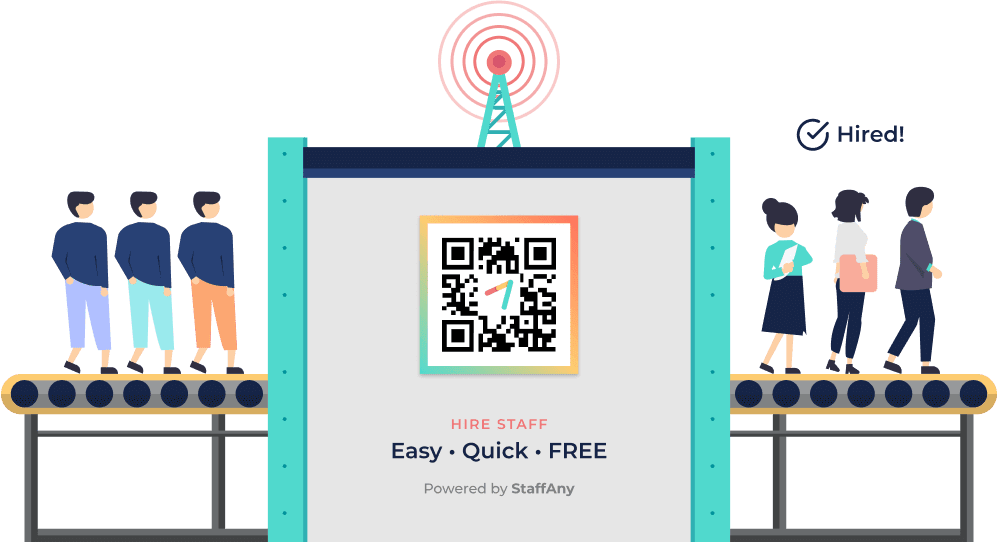As a business owner or HR representative, you may have come across the term “contract employee” in the course of your work. But what is a contract employee, what does this term actually mean, and how does it differ from other types of workers?
In this article, we will explore what contract employee is, as well as the pros and cons of hiring them for your organisation.
What is Contract Employee?

A contract worker, also known as a temporary employee or contingent worker, is an individual who is hired for a specific period of time or project.
Contract workers are typically brought on to fulfil a particular need, such as to cover for a full-time worker on leave or to work on a specific project that requires specialised skills.
Unlike full-time workers, contract employees are not permanent members of an organisation and are not entitled to the same benefits and protections.
Contract worker may be hired directly by the company or through a staffing agency, which acts as an intermediary between the employee and the company.
In either case, the contract employee’s pay and benefits are typically determined by the terms of their contract, rather than by the company’s standard compensation and benefits policies.
What are Types of Employee?
It’s important to note that these categories are not mutually exclusive, and an individual may exhibit characteristics of multiple types. Here are some common types of employees:
1. Full-time Employees
These are individuals who work a standard number of hours per week as defined by the organization, typically 35 to 40 hours.
Full-time employees are often entitled to benefits such as healthcare, retirement plans, and paid time off. They have a long-term commitment to the organization and are usually involved in the day-to-day operations.
2. Part-time Employees
Part-time employees work fewer hours than full-time employees. They are often hired to meet fluctuating business demands or to provide additional coverage during busy periods.
In addition, part-time employees may or may not be eligible for benefits, depending on the organization’s policies and local labor laws.
3. Temporary Employees
These employees are hired for a specific period or project. They provide short-term support to meet immediate needs, such as seasonal demand or specific expertise.
Temporary employees are typically not eligible for benefits, and their employment ends when the defined period or project is completed.
4. Seasonal Workers
Seasonal workers are hired to meet the demands of specific seasons or events. Examples include hiring additional staff for the holiday season, summer tourism, or busy periods like festivals or trade shows. Seasonal workers are typically temporary employees and often have fixed employment durations.
5. Interns
Interns are individuals who work for a fixed duration to gain practical experience in a particular field. They are often students or recent graduates looking to apply their academic knowledge in a professional setting. Internships can be paid or unpaid, depending on the organization and applicable labor laws.
It’s important for HR managers to understand the different types of employees in their organization and tailor HR policies and practices to meet their unique needs.
Each category requires specific considerations regarding hiring, onboarding, training, benefits, and performance management to ensure a productive and engaged workforce.
Read more: 21 Ways to Motivate Your Employees
Differences between Contract Workers and Regular Workers

Knowing the difference between a contract worker and a regular employee can help you decide which type of employee to hire on your team or which type of role to pursue.
Even so, it can be useful to confer with an expert in employment law to make the right choice for your situation and location. To help you get started, here are some common differences between contract workers and regular workers.
1. Job Security
One of the most significant differences between contract workers and regular workers is job security. Regular workers are typically employed on an ongoing basis and are entitled to certain legal protections, such as the right to notice and severance pay if they are terminated.
On the other hand, contract employees are hired for a specific period of time or project and may not have the same protections. This means that their employment may be terminated at the end of their contract without notice or severance pay.
2. Benefits
Another significant difference between contract workers and regular workers is benefits. A regular or full-time employee is typically entitled to employee benefits such as health insurance, retirement plans, and paid time off.
Contract workers, on the other hand, are not entitled to these benefits unless they are specifically included in their contract. This means that contract worker may need to pay for their own health insurance or even provide their own equipment.
3. Taxes
Many contract employees are responsible for paying their own taxes, including income and self-employment taxes. This is because they are not considered employees of the company and are instead classified as independent contractors. On the other hand, full-time workers have taxes withheld from their paychecks by the employer.
Read more: 8 Elements of Employee Engagement
Benefits of Hiring Contract Employees

Despite the differences between contract employees and permanent employees, there are several benefits to hiring contract employees for your organisation. Here are a few:
1. Flexibility
One of the primary benefits of hiring contract workers is flexibility. Contract employees can be a great option for businesses that need to adjust their workforce quickly in response to changing needs because they are hired for a specific period of time or project.
Contract workers can be brought on for short-term projects or to cover for full-time workers who are on leave, and then let go when the project is complete or the full-time worker returns.
2. Cost Savings
Another benefit of hiring contract workers is cost savings. Because contract employees are not entitled to the same benefits and protections as full-time workers, they can be less expensive to hire.
Additionally, because contract employees are hired for a specific period of time or project, businesses do not have to pay payroll taxes and can avoid the long-term costs associated with hiring and retaining full-time workers.
3. Specialised Skills
Contract employee can be a great option for businesses that need specialised skills for a specific project or task. Because contract employees are often hired for their specific expertise, they can bring a unique skill set to the organisation.
This can be particularly valuable for businesses that do not have the resources or need to hire a full-time worker with the same skill set.
Downsides of Hiring Contract Employees
While there are several benefits to hiring contract employees, there are also some downsides to consider when you hire contract employees. Here are a few:
1. Lack of Loyalty
As the name suggests, contract employees are not permanent members of the organisation, so they may not feel the same sense of loyalty or commitment to the company as full-time workers. This can make it more difficult to build a strong culture and may lead to lower levels of engagement and productivity.
2. Training Time
Contract employees are often hired for their specific expertise. Thus, they may require additional training or onboarding time to get up to speed on the organisation’s processes and systems. This can be time-consuming and may result in a temporary reduction in productivity.
3. Legal Risks
There are some legal risks associated with hiring contract employees. If a contract employee is misclassified as an independent contractor when they should be considered an employee, the organisation may be liable for back pay, benefits, and other legal damages.
It is important for organisations to carefully review the terms of their contracts and ensure that contract employees are properly classified.
Streamline Job Applications Easily & Quickly with Applicant Tracking System

Contract employees can be a valuable addition to any organisation, providing flexibility, cost savings, and specialised skills. However, it is important to carefully consider the differences between contract employees and full-time workers, as well as the potential downsides of hiring contract employees.
By understanding the benefits and risks of hiring contract employees, organisations can make informed decisions about their workforce and ensure that they are able to meet their business goals and objectives.
Simplify your hiring process to find the right person in half the time with Staffany’s applicant tracking system. A number of benefits are provided by our software:
1. Reach Out to Jobseekers Easily
Effortlessly and swiftly disseminate multiple job openings across diverse platforms using the auto-generated QR code and URL. This streamlined process simplifies your job postings efforts and enhances your reach to potential candidates across various job boards and external platforms.
2. Manage Applicants Across The Hiring Process
Initiate candidate evaluations immediately upon job applicants’ submission. Experience the convenience of effortlessly accessing applicant details and seamlessly track candidates, all within a single unified platform provided by our applicant tracking system (ATS).
3. Customise Your Job Application Form
Ensure you discover the most qualified candidates by utilising our customisable application form, equipped with precisely tailored screening questions.
This innovative feature empowers you to pinpoint the ideal staff for your job openings, enhancing the efficiency of your recruitment process through the advanced capabilities of our applicant tracking system (ATS).
Looking for an easy and efficient way to generate payslips for your contract employees? Check out StaffAny’s payslip generator! With just a few clicks, you can create accurate and professional payslips for all of your contract employees. Contact StaffAny to learn more and get started today!











